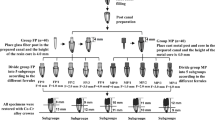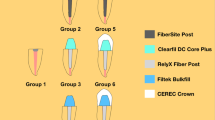Abstract
In endodontically treated teeth, cuspal coverage plays a fundamental role in reducing the risk of fracture. However, the adhesive techniques with or without fiber post increased the possibilities in restoring root-filled teeth. The aim of this study was to determine the effect of the fiber post and/or post length and/or cuspal coverage on the fracture resistance of endodontically treated maxillary premolars. Seventy intact single-rooted maxillary premolars were selected and divided in seven groups of ten each: “intact teeth” (control), “inlay without fiber post” (G1), “inlay with long fiber post” (G2), “inlay with short fiber post” (G3), “onlay without fiber post” (G4), “onlay with long fiber post” (G5), and “onlay with short fiber post” (G6). Except for intact teeth, all specimens were prepared with a mesio–occluso–distal (MOD) cavity, endodontically treated and restored with or without long or short post, with or without cusp coverage. All specimens were thermal-cycled, exposed to a cyclic loading, and then submitted to the static fracture resistance test. Fracture loads and mode of failure were evaluated. A statistically significant difference in fracture resistance was found between group 1 and the other groups (p < 0.001). χ2 test showed statistically significant differences in the patterns of fractures between the groups (p < 0.001). The highest number of favorable fractures was observed in groups 3 and 4. Similar fracture resistance was detected in maxillary premolars endodontically treated with MOD cavity preparations, restored with either direct resin composite with fiber post or cusp capping. The “short post” direct restoration may be a valid alternative in the restoration of root-filled premolars.
Similar content being viewed by others
References
Trope M, Ray HL Jr (1992) Resistance to fracture of endodontically treated roots. Oral Surg Oral Med Oral Pathol 73(1):99–102
Reeh ES, Ross GK (1994) Tooth stiffness with composite veneers: a strain gauge and finite element evaluation. Dent Mater 10(4):247–252
Linn J, Messer HH (1994) Effect of restorative procedures on the strength of endodontically treated molars. J Endod 20(10):479–485
Santos AF, Meira JB, Tanaka CB, Xavier TA, Ballester RY, Lima RG, Pfeifer CS, Versluis A (2010) Can fiber posts increase root stresses and reduce fracture? J Dent Res 89(6):587–591
Mannocci F, Qualtrough AJ, Worthington HV, Watson TF, Pitt Ford TR (2005) Randomized clinical comparison of endodontically treated teeth restored with amalgam or with fiber posts and resin composite: five-year results. Oper Dent 30(1):9–15
Mannocci F, Bertelli E, Sherriff M, Watson TF, Ford TR (2002) Three-year clinical comparison of survival of endodontically treated teeth restored with either full cast coverage or with direct composite restoration. J Prosthet Dent 88(3):297–301
Grandini S, Goracci C, Tay FR, Grandini R, Ferrari M (2005) Clinical evaluation of the use of fiber posts and direct resin restorations for endodontically treated teeth. Int J Prosthodont 18:399–404
Salameh Z, Sorrentino R, Ounsi HF et al (2007) Effect of different all-ceramic crown system on fracture resistance and failure pattern of endodontically treated maxillary premolars restored with and without glass fiber posts. J Endod 33:848–851
Lohbauer U, von der Horst T, Frankenberger R, Krämer N, Petschelt A (2003) Flexural fatigue behavior of resin composite dental restoratives. Dent Mater 19(5):435–440
Soh MS, Yap AU, Sellinger A (2007) Physicomechanical evaluation of low-shrinkage dental nanocomposites based on silsesquioxane cores. Eur J Oral Sci 115:230–238
Touati B, Aidan N (1997) Second generation laboratory composite resins for indirect restorations. J Esthet Dent 9(3):108–118
Ausiello P, De Gee AJ, Rengo S, Davidson CL (1997) Fracture resistance of endodontically treated premolars adhesively restored. Am J Dent 10:237–241
Soares PV, Santos-Filho PC, Martins LR, Soares CJ (2008) Influence of restorative technique on the biomechanical behavior of endodontically treated maxillary premolars. Part I: fracture resistance and fracture mode. J Prosthet Dent 99:30–37
Soares PV, Santos-Filho PC, Gomide HA, Araujo CA, Martins LR, Soares CJ (2008) Influence of restorative technique on the biomechanical behavior of endodontically treated maxillary premolars. Part II: strain measurement and stress distribution. J Prosthet Dent 99:114–122
Lertchirakarn V, Palamara JE, Messer HH (2003) Finite element analysis and strain-gauge studies of vertical root fracture. J Endod 29:529–534
Marchesi G, Breschi L, Antoniolli F, Di Lenarda R, Ferracane J, Cadenaro M (2010) Contraction stress of low-shrinkage composite materials assessed with different testing systems. Dent Mater 26(10):947–953
Lu H, Stansbury JW, Bowman CN (2005) Impact of curing protocol on conversion and shrinkage stress. J Dent Res 84(9):822–826
Tauböck TT, Bortolotto T, Buchalla W, Attin T, Krejci I (2010) Influence of light-curing protocols on polymerization shrinkage and shrinkage force of a dual-cured core build-up resin composite. Eur J Oral Sci 118(4):423–429
van Dijken JW (2010) Durability of resin composite restorations in high C-factor cavities: a 12-year follow-up. J Dent 38(6):469–474
Hannig C, Westphal C, Becker K, Attin T (2005) Fracture resistance of endodontically treated maxillary premolars restored with CAD/CAM ceramic inlays. J Prosthet Dent 94:342–349
Hurmuzlu F, Kiremitci A, Serper A, Altundasar E, Siso SH (2003) Fracture resistance of endodontically treated premolars restored with ormocer and packable composite. J Endod 29:838–840
Hurmuzlu F, Serper A, Siso SH, Er K (2003) In vitro fracture resistance of root-filled teeth using new-generation dentine bonding adhesives. Int Endod J 36:770–773
Sagsen B, Aslan B (2006) Effect of bonded restorations on the fracture resistance of root filled teeth. Int Endod J 39:900–904
Sorrentino R, Salameh Z, Zarone F, Tay FR, Ferrari M (2007) Effect of post-retained composite restoration of MOD preparations on the fracture resistance of endodontically treated teeth. J Adhes Dent 9:49–56
Goncalves LA, Vansan LP, Paulino SM, Sousa Neto MD (2006) Fracture resistance of weakened roots restored with a transilluminating post and adhesive restorative materials. J Prosthet Dent 96(5):339–344
Schwartz RS, Robbins JW (2004) Post placement and restoration of endodontically treated teeth: a literature review. J Endod 30(5):289–301
Radovic I, Mazzitelli C, Chieffi N, Ferrari M (2008) Evaluation of the adhesion of fiber posts cemented using different adhesive approaches. Eur J Oral Sci 116(6):557–563
Bitter K, Noetzel J, Stamm O, Vaudt J, Meyer-Lueckel H, Neumann K, Kielbassa AM (2009) Randomized clinical trial comparing the effects of post placement on failure rate of postendodontic restorations: preliminary results of a mean period of 32 months. J Endod 35(11):1477–1482
Mondelli RF, Ishikiriama SK, de Oliveira Filho O, Mondelli J (2009) Fracture resistance of weakened teeth restored with condensable resin with and without cusp coverage. J Appl Oral Sci 17(3):161–165
Tamse A, Fuss Z, Lustig J, Kaplavi J (1999) An evaluation of endodontically treated vertically fractured teeth. J Endod 25(7):506–508
Tamse A, Zilburg I, Halpern J (1998) Vertical root fractures in adjacent maxillary premolars: an endodontic-prosthetic perplexity. Int Endod J 31(2):127–132
de V Habekost L, Camacho GB, Azevedo EC, Demarco FF (2007) Fracture resistance of thermal cycled and endodontically treated premolars with adhesive restorations. J Prosthet Dent 98(3):186–192
Assif D, Gorfil C (1994) Biomechanical considerations in restoring endodontically treated teeth. J Prosthet Dent 71(6):565–567
Tang W, Wu Y, Smales RJ (2010) Identifying and reducing risks for potential fractures in endodontically treated teeth. J Endod 36(4):609–617
Kovarik RE, Breeding LC, Caughman WF (1992) Fatigue life of three core materials under simulated chewing conditions. J Prosthet Dent 68(4):584–590
Huysmans MC, Peters MC, Van der Varst PG, Plasschaert AJ (1993) Failure behaviour of fatigue-tested post and cores. Int Endod J 26(5):294–300
Pierrisnard L, Bohin F, Renault P, Barquins M (2002) Corono-radicular reconstruction of pulpless teeth: a mechanical study using finite element analysis. J Prosthet Dent 88(4):442–448
Freedman GA (2001) Esthetic post-and-core treatment. Dent Clin North Am 45(1):103–116
Krejci I, Duc O, Dietschi D, de Campos E (2003) Marginal adaptation, retention and fracture resistance of adhesive composite restorations on devital teeth with and without posts. Oper Dent 28(2):127–135
Fokkinga WA, Le Bell AM, Kreulen CM, Lassila LV, Vallittu PK, Creugers NH (2005) Ex vivo fracture resistance of direct resin composite complete crowns with and without posts on maxillary premolars. Int Endod J 38(4):230–237
Siso SH, Hürmüzlü F, Turgut M, Altundaşar E, Serper A, Er K (2007) Fracture resistance of the buccal cusps of root filled maxillary premolar teeth restored with various techniques. Int Endod J 40(3):161–168
Bitter K, Meyer-Lueckel H, Fotiadis N, Blunck U, Neumann K, Kielbassa AM, Paris S (2010) Influence of endodontic treatment, post insertion, and ceramic restoration on the fracture resistance of maxillary premolars. Int Endod J 43(6):469–477
Soares CJ, Soares PV, de Freitas Santos-Filho PC, Castro CG, Magalhaes D, Versluis A (2008) The influence of cavity design and glass fiber posts on biomechanical behavior of endodontically treated premolars. J Endod 34(8):1015–1019
McLaren JD, McLaren CI, Yaman P, Bin-Shuwaish MS, Dennison JD, McDonald NJ (2009) The effect of post type and length on the fracture resistance of endodontically treated teeth. J Prosthet Dent 101(3):174–182
Giovani AR, Vansan LP, de Sousa Neto MD, Paulino SM (2009) In vitro fracture resistance of glass-fiber and cast metal posts with different lengths. J Prosthet Dent 101(3):183–188
Sorensen JA, Mrtinoff JT (1984) Intracoronal reinforcement and coronal coverage: a study of endodontically treated teeth. J Prosthet Dent 51:780–784
Cheung GSP, Chan TK (2003) Long-term survival of primary root canal treatment carried out in a dental teaching hospital. Int Endod J 36:117–128
Aquilino SA, Caplan DJ (2002) Relationship between crown placement and the survival of endodontically treated teeth. J Prosthet Dent 87:256–263
Lin CL, Chang YH, Liu PR (2008) Multi-factorial analysis of a cusp-replacing adhesive premolar restoration: a finite element study. J Dent 36(3):194–203
Chang YH, Lin WH, Kuo WC, Chang CY, Lin CL (2009) Mechanical interactions of cuspal-coverage designs and cement thickness in a cusp-replacing ceramic premolar restoration: a finite element study. Med Biol Eng Comput 47(4):367–374
Brunton PA, Cattell P, Burke FJ, Wilson NH (1999) Fracture resistance of teeth restored with onlays of three contemporary tooth-colored resin-bonded restorative materials. J Prosthet Dent 82(2):167–171
Mohammadi N, Kahnamoii MA, Yeganeh PK, Navimipour EJ (2009) Effect of fiber post and cusp coverage on fracture resistance of endodontically treated maxillary premolars directly restored with composite resin. J Endod 35(10):1428–1432
Newman MP, Yaman P, Dennison J, Rafter M, Billy E (2003) Fracture resistance of endodontically treated teeth restored with composite posts. J Prosthet Dent 89(4):360–367
Taha NA, Palamara JE, Messer HH (2009) Cuspal deflection, strain and microleakage of endodontically treated premolar teeth restored with direct resin composites. J Dent 37(9):724–730
Acknowledgments
The authors gratefully thanks Maicol Roglio, Alberto Gambino and Alberto Iuso for their cooperation in sample preparation.
Conflict of interest
The authors declare that they have no conflict of interest.
Author information
Authors and Affiliations
Corresponding author
Rights and permissions
About this article
Cite this article
Scotti, N., Scansetti, M., Rota, R. et al. The effect of the post length and cusp coverage on the cycling and static load of endodontically treated maxillary premolars. Clin Oral Invest 15, 923–929 (2011). https://doi.org/10.1007/s00784-010-0466-y
Received:
Accepted:
Published:
Issue Date:
DOI: https://doi.org/10.1007/s00784-010-0466-y




